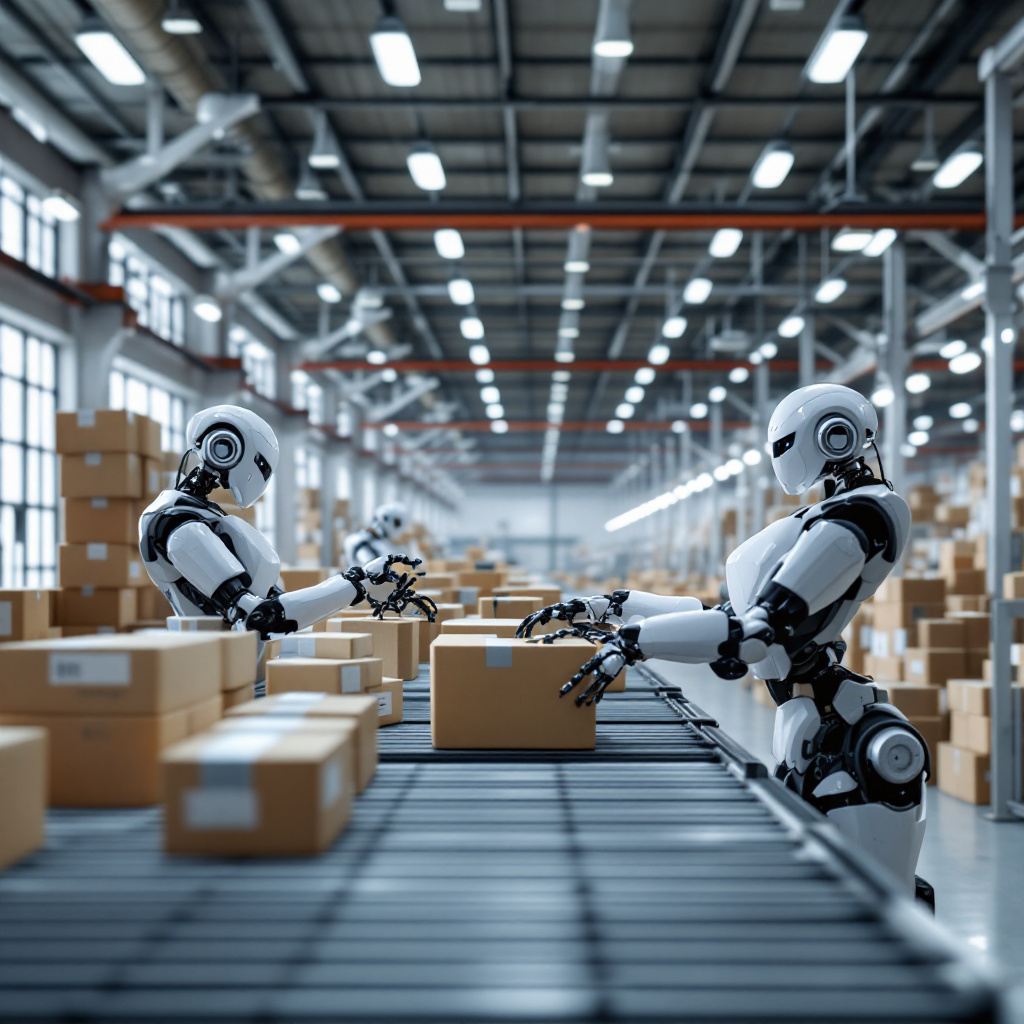2025 is the tipping point for AI in logistics workflows
2025 is the tipping point for innovations that are redefining AI in logistics workflows. Market forecasts show that the AI in logistics and supply chain market will reach USD 20.1 billion in 2024, with a projected CAGR of 25.9% through to 2034. This trajectory confirms that the adoption of agentic AI is no longer experimental—it is a critical shift driving operational excellence. By 2025, 64% of logistics companies have adopted AI-based solutions, indicating that AI agents for logistics are becoming integral to supply chain management.
Real-time data integration and predictive analytics are now standard features in adaptive logistics workflows. An AI agent can analyze data from traffic, weather, inventory, and customer orders to optimize the entire delivery process. Companies are already using AI to automate their workflows and cut operational delays. For instance, a global carrier reported a 30% reduction in delivery delays after implementing automated demand sensing using agentic AI systems and AI solutions tailored for freight planning. AI can transform traditional logistics operations into intelligent automation networks that scale efficiently.
2025 is poised to see the full potential of AI capabilities in logistics automation. The power of AI lies in its ability to orchestrate entire logistics workflows while responding instantly to changes in demand or market conditions. Businesses integrating AI tools into their supply chain benefit from minimized errors, lower logistics costs, and increased adaptability. Agents are designed to streamline workflows and enhance decision-making speed by leveraging AI agents that continuously learn from each decision cycle. This is the era where AI is transforming logistics through the strategic implementation of AI-powered workflow solutions that deliver measurable results for the logistics sector.

Building AI agentic workflow to automate supply chain
Building AI agentic workflow systems to automate supply chain processes in 2025 is a priority for many logistics providers. An agentic workflow refers to a network of autonomous AI agents that coordinate and execute interconnected tasks across procurement, inventory management, and order fulfilment. This automation with AI harnesses the power of agentic AI to ensure decision engines are informed by reliable data ingestion and continuous learning loops. These components allow an AI agent to optimize each workflow stage automatically, with minimal human intervention.
Leveraging AI agents in this way enables companies to optimize logistics workflows holistically. For example, one major retailer implemented this approach and reduced stockouts by 45% by integrating AI-driven demand forecasting and warehouse allocation. Agents can provide insights into pricing, procurement cycles, and distribution planning by processing millions of data points in real time. AI applications in the supply chain extend from raw material sourcing to last-mile delivery, providing end-to-end visibility.
The future of agentic AI depends on integrating AI frameworks into the daily operations of logistics companies and ensuring agents require minimal manual oversight. Implementing agentic AI creates flexibility during volatile market conditions, allowing rapid adaptation. Companies using AI-powered workflow platforms experience reduction in costly inefficiencies and achieve scalable operations. With leveraging agentic AI, enterprises can harness the power of AI development to automate logistics from start to finish, making intelligent decisions that align with evolving customer and supply demands.
For organisations seeking guidance on AI workflows to transform operational frameworks, industry-specific case studies on logistics automation case studies reveal key strategies for implementation.
Drowning in emails?
Here’s your way out
Save hours every day as AI Agents label and draft emails directly in Outlook or Gmail, giving your team more time to focus on high-value work.
AI agent and automation for route optimisation and last-mile delivery
AI agents excel at optimising delivery routes and last-mile operations by integrating traffic data, weather conditions, and customer delivery windows into dynamic route optimization models. In a 2025 operational environment, using AI-powered applications can reduce fuel consumption by as much as 20% while improving on-time delivery rates. Agents can analyze data from GPS sensors, urban transport schedules, and local regulations to shape routes that meet delivery commitments without unnecessary detours.
Automation with AI extends into managing autonomous delivery fleets, including last-mile delivery bots and drones. These systems, coordinated via a central AI-powered workflow, enable drop-off times averaging just 15 minutes in dense urban settings. Such performance is possible because agents continuously process and adapt to changing variables in real time, increasing customer satisfaction while reducing operational costs.
Pilot programmes highlight how AI to optimize routes and automate logistics reduces congestion impact and enhances delivery reliability. For example, integrating AI in logistics technology allows fleets to redistribute workload automatically based on current traffic flows, significantly improving throughput. AI models designed for route optimization are part of a broader strategy to transform logistics by weaving intelligent automation throughout every stage of delivery operations.
As demand for shorter delivery windows grows, companies can streamline logistics by adopting AI-driven logistics planning tools. Accessible examples on faster response times in logistics demonstrate how AI to automate route planning delivers measurable ROI for logistics operations.
AI-driven logistics: ai applications in predictive scheduling and demand forecasting
AI-driven logistics strategies rely heavily on AI applications for predictive scheduling and demand forecasting. In 2025, advanced AI models achieve up to 95% forecasting accuracy by processing historical trends and external market factors simultaneously. Agents analyze data to anticipate demand fluctuations, enabling organisations to allocate warehouse labour and transport resources in alignment with real-time requirements.
One example includes an FMCG company reporting savings exceeding £2 million annually from AI-driven forecasting that aligned production schedules with consumer behaviour patterns. This application reduces both overstocking and costly stockouts by optimising buffer stock allocation. AI to automate predictive workflows also enhances resilience against sudden disruptions, helping companies recover from delays faster.
Agents can analyze data relating to weather, geopolitical risks, and customer purchasing habits to create highly adaptive schedules. Companies that integrate these AI capabilities into supply chain management find that the AI-powered workflow approach supports business agility while cutting waste. AI workflows to transform supply chains in this manner replace traditional automation with systems that evolve continuously, improving forecasts over time.
To explore how AI can enhance responsiveness, businesses can review applications like supply chain customer service automation, illustrating how integrated scheduling aligns customer commitment with operational capacity.
Drowning in emails?
Here’s your way out
Save hours every day as AI Agents label and draft emails directly in Outlook or Gmail, giving your team more time to focus on high-value work.
Logistics automation and generative AI in warehouse operations and security
Logistics automation is reaching new heights with the integration of generative AI in warehouse operations. AI agents are reshaping the way warehouses operate by automating picking, packing, and sorting processes, increasing throughput by up to 40%. Generative AI can design layout plans that adapt dynamically to seasonal demand, ensuring optimal use of available space.
Security also benefits from AI-driven solutions. Automated anomaly detection systems monitor cargo in real time, using advanced AI systems to identify and address fraud risks before they escalate. Continuous 24/7 warehouse monitoring has been shown to reduce shrinkage by 12%, a significant cost saving in the logistics sector.
Agents help prevent stock misplacement and delays by synchronising all warehouse functions under one intelligent control system. By integrating AI into both operations and security measures, companies achieve seamless coordination. AI development in this space produces agentic AI systems that learn from incidents, enabling proactive risk management for logistics and supply chain management efforts.
Warehouse-focused AI solutions showcase the power of agentic AI to increase efficiency and safeguarding measures simultaneously. Examples of tracking automation for logistics show how coordination is enhanced not just in storage, but throughout the supply chain.

AI revolution: transform logistics through agentic AI in 2025
The AI revolution will define how businesses transform logistics in 2025 and beyond. Agentic AI is poised to shift industries from manual coordination to fully autonomous supply chains. Leveraging AI agents for logistics across transportation, warehousing, and customer service ensures operations run with scalability, resilience, and end-to-end visibility.
In this context, implementing agentic AI delivers advantages in resilience and adaptability. Agents can analyze data streams in real time, adjusting procurement schedules, rerouting shipments, and notifying customers of changes automatically. This approach to integrating AI into the supply chain builds agility into every layer of operations.
The future of agentic AI includes continuous advancements in generative AI applications and the integration of AI frameworks designed to keep pace with evolving supply chain challenges. AI can transform fragmented networks into coherent, responsive systems capable of maintaining service quality during unexpected disruptions.
By harnessing the power of AI, logistics providers can optimize the coordination between different operational elements, resulting in measurable reductions in logistics costs. The power of agentic AI lies in its ability to streamline workflows without sacrificing precision, delivering on the promise of intelligent automation. As AI is revolutionizing the logistics industry, companies that use AI to automate and optimize systems will set themselves apart in an increasingly competitive market.
FAQ
What is an AI agent in logistics?
An AI agent in logistics is a software entity capable of autonomously managing tasks such as route planning, demand forecasting, and warehouse automation. These agents can analyze data, make decisions, and adapt workflows in real time.
How can AI improve route optimization?
AI improves route optimization by processing live traffic data, weather updates, and delivery schedules simultaneously. This results in efficient routing, reduced fuel consumption, and faster delivery times.
Why is 2025 significant for AI in logistics?
2025 marks widespread adoption of AI-based solutions in logistics, with over 64% of companies implementing these systems. It is the year when AI becomes essential infrastructure rather than an experimental tool.
What are the benefits of predictive scheduling?
Predictive scheduling ensures that labour and transport resources meet demand accurately. This reduces idle time, cuts costs, and improves supply chain resilience.
Can generative AI help in warehouse operations?
Yes, generative AI designs optimal warehouse layouts and adapts them to demand changes. It also enhances overall efficiency by improving picking and packing workflows.
How does AI enhance supply chain security?
AI uses anomaly detection to identify potential risks like fraud or theft. Continuous monitoring provides faster responses to incidents, reducing losses.
Is AI in logistics expensive to implement?
While the initial setup of AI systems may require investment, cost savings from efficiency gains and error reduction often outweigh these expenses over time.
What sectors within logistics benefit most from AI?
Sections like transportation, warehousing, demand planning, and customer service see significant improvements. AI tools can automate repetitive tasks while increasing accuracy.
How do logistics companies integrate AI?
They start by building AI frameworks for specific workflows like inventory management. Over time, more AI-powered workflow solutions are added for end-to-end coverage.
What is the future of AI in logistics?
The future of AI in logistics includes more autonomous operations and deeper integration with generative AI. Expect AI to optimize entire supply chains to meet evolving global demands.
Drowning in emails?
Here’s your way out
Save hours every day as AI Agents label and draft emails directly in Outlook or Gmail, giving your team more time to focus on high-value work.